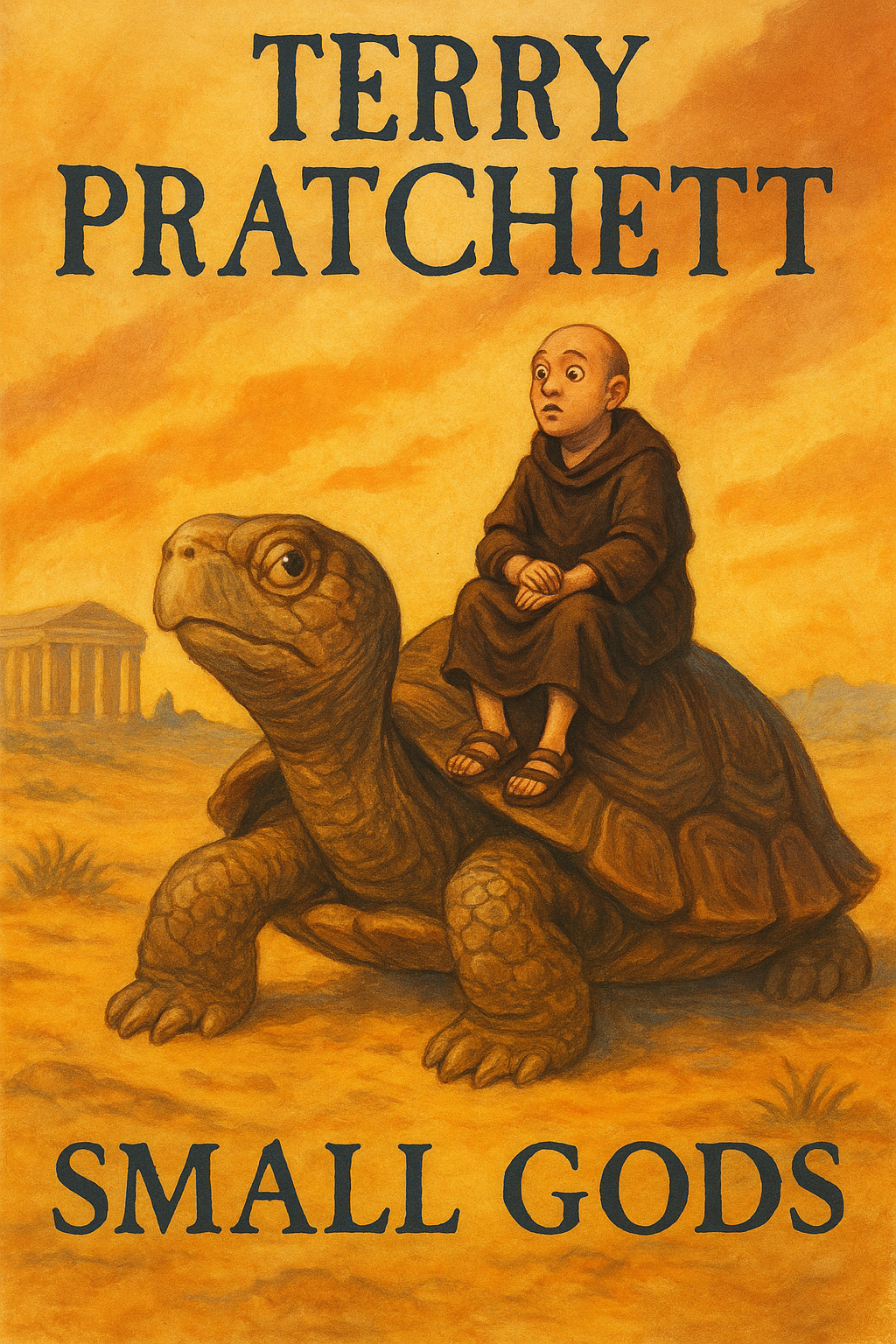Terry Pratchett’s Small Gods, one of the standout instalments in the Discworld series, is an extraordinary blend of wit, satire, and philosophical inquiry. While the Discworld books are known for their humour and fantasy, Small Gods stands apart as a profound commentary on religion, belief, and institutional dogma — all delivered with Pratchett’s signature charm and sharp intellect.
A Fable of Gods and Mortals
In the world of Small Gods, gods gain power through belief. If no one believes in them, they dwindle to nothing. The Great God Om, once omnipotent, finds himself trapped in the body of a tortoise because only one true believer remains — a humble novice named Brutha. The narrative then follows the journey of this unlikely pair as they confront the corrupt religious hierarchy, embodied by the sinister Exquisitor Vorbis.
What emerges is a story that is equal parts theological allegory and comedic adventure. But make no mistake — while Small Gods is often hilarious, it never treats its subjects lightly. It is one of the most serious of Pratchett’s works, wrestling with weighty ideas in a deceptively lighthearted voice.
Religion as Power and Paradox
Pratchett’s genius in Small Gods lies in his ability to dissect organised religion without cynicism. He does not ridicule belief itself but takes aim at the machinery built around it — the institutions that co-opt faith for control and manipulation. Vorbis, with his cold efficiency and moral certitude, is a terrifyingly believable villain, not because he’s a caricature, but because he’s so unflinchingly logical in his fanaticism.
In contrast, Brutha is a beacon of sincerity and introspection. Though he starts as a naïve and unquestioning novice, his journey becomes one of philosophical awakening. His dialogues — both internal and with Om — explore what it truly means to believe, to question, and to understand.
Om’s struggle, too, is illuminating. As a god, he is used to unquestioning worship, but as a tortoise, he must rely on human companionship and learn humility. Through this role reversal, Pratchett cleverly critiques divine infallibility and the assumptions underpinning religious dogma.
Humor with a Razor Edge
Pratchett’s humor is as sharp as ever in Small Gods, but here it serves a deeper purpose. Puns, irony, and absurdity are tools not just for laughs, but for revelation. The novel is packed with satirical jabs — at blind obedience, bureaucratic cruelty, and the absurd lengths institutions will go to preserve their own power.
Yet, this satire is never mean-spirited. Even as he exposes the hypocrisies of religious institutions, Pratchett respects the personal power of belief. In Small Gods, laughter is a form of resistance — a way to deflate authoritarian posturing and reassert individual moral agency.
Brutha: A Hero of Conviction
Brutha is one of the most compelling protagonists in the Discworld universe precisely because he is so ordinary. He has no magical powers, no strategic genius. What he has is an unwavering honesty, a brilliant memory, and a relentless desire to do what is right — even when doing so is terrifying or painful.
His transformation is subtle but profound. He evolves from a passive follower to a thoughtful, moral leader who ultimately redefines his faith. His final decisions are not only moving but emblematic of the novel’s philosophical heart: true belief should liberate, not oppress.
The World of Omnia and Beyond
Set primarily in the theocratic state of Omnia, Small Gods paints a vivid picture of a society gripped by fear and repression. From the silent deserts to the bustling temples, every detail is steeped in both realism and symbolic resonance. The world feels fully realized, yet every location and character seems to exist in service of the novel’s central themes.
From Brother Nhumrod’s petty cruelty to the Librarian’s unexpected cameos, every moment reinforces the contrast between institutional power and individual humanity. The Great Library of Ephebe and its philosopher-citizens add another layer, offering comedic but sincere reflections on reason, skepticism, and intellectual freedom.
A Timeless Message
Although set in a fantastical universe, Small Gods is sharply relevant to the real world. Its themes — religious extremism, state control, the questioning of authority — remain pressing concerns. Yet, rather than preaching, Pratchett invites readers to laugh, think, and feel. He gently encourages introspection rather than demanding agreement.
In many ways, Small Gods is a deeply hopeful book. It affirms that one person’s conscience can matter, that change is possible even within entrenched systems, and that gods — whether real or imagined — are shaped by the hearts of their believers.
Legacy and Literary Merit
Small Gods is frequently cited by fans and critics as one of the finest Discworld novels, and for good reason. It’s a standalone story, accessible to new readers while offering rich rewards to long-time fans. It’s also one of the best examples of speculative fiction as a vehicle for philosophical exploration.
With this novel, Terry Pratchett proved that fantasy doesn’t have to escape reality — it can confront it, reinterpret it, and offer fresh perspectives on the oldest of questions.
Why You Should Read It
If you’ve ever wondered about the nature of faith, the dynamics of power, or the importance of doubt, Small Gods is a must-read. It’s a novel that respects your intelligence, engages your emotions, and challenges your preconceptions — all while making you laugh out loud.
It is, in every sense, divine.

